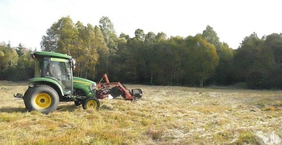With more than 60 representatives from agriculture, politics, nature conservation and science, as well as the project team, the fourth (virtual) meeting of the Project Accompanying Working Group (PAG) for the large-scale nature conservation project Ribbons of Life in Hunsrück took place at the end of April.
The current status of the project development as well as the future activities were presented and discussed in detailed question rounds by and with the participants. The results of the flora-fauna surveys, the evaluations of the digital elevation model and the hydrological survey, the status of the basic determination of the care and development plan (PEPL), as well as the situation in the funding area determination were presented. An integral part of the PEPL is the 'socio-economic analysis', which is carried out by the Institute for Rural Development Research (IfLS).
Jörg Schramek presented the results of the recording and evaluation of the socio-economic framework conditions as well as the strengths, weaknesses, opportunities and threats for the large-scale nature conservation project derived from this. He also gave an outlook on the further procedure of the socio-economic analysis: The further work will focus on the priority areas and objectives identified by the planners BGHplan and FÖA. Opportunities for regional development and cooperation will be identified that can be used to flank the conservation measures. In addition, the economic viability of potential value chains that result in benefits to the project will be explored. For example, the further processing of cuttings from wet and wetland meadows into biochar or the energetic utilization of coppice wood.
In the context of the overall project, the focus is also on the further development and sharpening of the profile of the large-scale nature conservation project, including the concretization of areas and sites, the technical exchange with local experts and the concretization and coordination of measures. The next PAG meeting is planned for fall 2021.
Contact persons at IfLS: Jörg Schramek (schramek[at]ifls.de), Dr. Ulrich Gehrlein (gehrlein[at]ifls.de), Svea Thietje (thietje[at]ifls.de) and Dr. Johannes Carolus (carolus[at]ifls.de)
